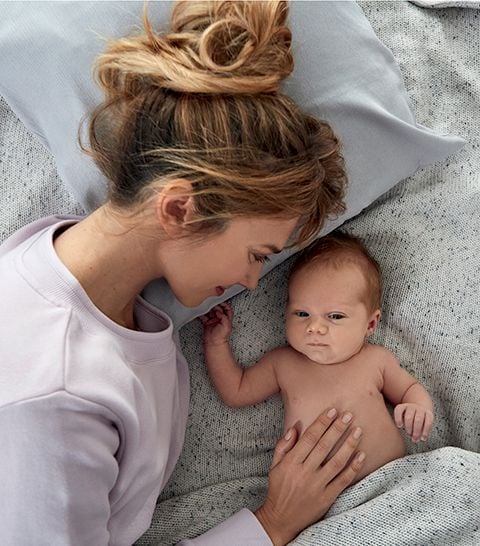
Why is a sleep routine important for your baby?
A well-set sleep routine gives your baby a sense of predictability, this makes them feel comfortable and safe to wind down for the day. By consistently following sleeptime and naptime routines, you are paving the way for your little one to sleep on their own throughout the night. These good practices will also help them throughout their adult life as proper sleep ensures healthy growth and development, improved mood and behaviour and enhanced cognitive abilities.

When can you get a baby on a sleep schedule?
Your little one’s internal clock will start becoming more predictable once they turn two months old. During this time, you can start implementing a basic routine that includes swaddling, playing white noise, dimming the lights and adjusting the room temperature so it is not too cold or too hot.
As they grow to be between three to six months of age, their bedtime, naptime and wake times will be more predictable. As you understand their patterns, you can work towards putting them down for sleep while they are drowsy but still awake, teaching them the valuable skill to sleep on their own.
How to get a baby on a sleep schedule?
Every kid is unique in their own way and so are their sleeping preferences. While there is no one-size-fits-all approach to establishing a healthy sleep schedule, the below tips will help them doze off into dreamland in a smoother and easier fashion.
- Choose the right gear Investing in quality sleep products will ensure your little bundle of joy is comfortable and safe during the night. Our cosy crib mattresses, swaddle wraps, sleeping bags and blankets will provide a warm and relaxing environment to rest in.
- Set the right room temperature Maintain a comfortable room temperature between 20-22°C (68-72°F) to create an optimal sleep environment. Use lightweight blankets or sleep sacks for warmth. You can also dress your baby in layers, this way if they feel hot you can remove a few to provide comfort.
- Establish a bedtime routine Activities such as a warm bath, a gentle oil massage or reading a bedtime story will help your baby wind down for the day. Your little one will look forward to this special bonding time and fall asleep more easily.
- Look out for sleep cues If your little one is rubbing their eyes, yawning or being cranky, they might just be tired and want to catch some zzz. Watch out for these signs next time so that you can put them to bed when they are drowsy.
- Don’t jump at the first noise Your baby is capable of self-soothing after three months of age. After this stage, if you notice any movement or noise from your little one’s bassinet try not to pick them up instantly. Give them a few minutes to see if they can fall asleep on their own. If you want to check-in on them, simply have a peep without picking them up as increased stimulus and excitement will break their rhythm.
- Give your baby a pacifier to suck on According to research, sucking has extraordinary calming power. It helps lower the heart rate, blood pressure and stress levels, lulling your baby to sleep. This works whether you are breastfeeding your little one or giving them their favourite binky.

Addressing Common Sleep Challenges
-
Night Wakings During the first few months, your baby will wake up several times throughout the night for feeding or due to some other discomfort. You can cope with these disturbed nights by asking your partner for support. If you’re breastfeeding, request your other half to take charge for morning nappy changes and dressing so you can catch some sleep. And, if you’ve chosen formula, your husband can share the feeds. This will also help them bond with the baby.
-
Changes in baby’s sleep patterns As your baby grows older will have a growth spurt, start teething and walking or might fall sick. All of these different stages will impact your baby’s sleep cycle. Be prepared to change their bedtime routine to adapt to their growing needs. For example, if they are learning how to walk, you can massage their legs before sleep to help relax them. This will help strengthen their muscles and bones.

When should I change my baby’s sleep routine?
While some pre bedtime activities can remain unchanged throughout their life, for example white noise and dimmed lights, some others need to be discarded as they grow older. Weaning them off the below habits will ensure safety and comfort.
- Swaddling: This is one of the first practices that should be stopped as soon as your baby can roll to their belly.
- Using pacifiers: Your kid will be emotionally ready to give up their favourite pacifier between the ages of two and four. As your little bub approaches the 18 month mark, limit their use of binkies to night time and stressful situations like visit to a doctor.
- Rocking: After six months, your baby will grow out of being rocked to sleep.
Establishing a sleep routine for your baby is a rewarding journey that requires patience and consistency. At Mamas & Papas, we are committed to supporting you every step of the way. Remember, each baby is unique, so finding the routine that works for you may take time. Embrace the process and cherish the moments of restful sleep for both you and your little one.
Don't forget to explore our range of Mamas & Papas’ essentials designed to make your baby's sleep experience comfortable and safe. Happy sleeping!




